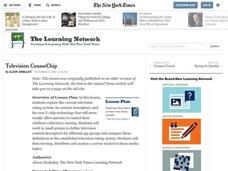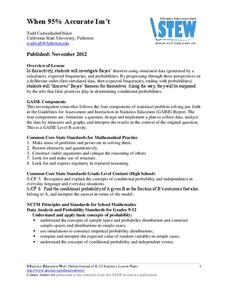Curated OER
Strong Convictions
How can the rhetorical structure of an editorial help to develop its argument? Use this New York Times editorial to emphasize the importance of structure in a piece of informational text. Adolescent writers then use the editorial as a...
Curated OER
What's My Point: Persuasive Writing
Why do readers need to know an author’s purpose? How do you figure out what that purpose is? Guide your pupils through a series of activities that show them how to identify various techniques and structures used in persuasive writing....
Maryland Department of Education
The Concept of Diversity in World Literature Lesson 10: Author's Purpose Seminar
Why did Chinua Achebe write "An Image of Africa: Racism in Conrad's Heart of Darkness" in response to Conrad's novel? As part of a study of Things Fall Apart, class members conduct a socratic seminar focused on Achebe's purpose and...
Curated OER
Family Life
What is family? Challenge your scholars to write an encompassing definition of what this word means to them. After reading "It May Be a Family Matter, But Just Try to Define Family," class members discuss the emotional issues surrounding...
Curated OER
Eloquent Words
Logan’s Lament, a speech delivered by Mingo Chief Logan in 1774, provides pupils with an opportunity to not only study the historical events surrounding the battle between Native Americans and the Europeans for the West Virginia...
Curated OER
Television CensorChip
Explore the current television rating system, its content descriptors, and the new V-chip technology that more readily allow parents to control their child's television viewing. Help learners develop a survey that will determine the pros...
Curated OER
Adolescent Sleep
Students discuss, summarize, and express alternative positions regarding a study on adolescent sleep. They examine arguments for and against changing the school start time for high-school students, based upon the findings of a scientific...
Curated OER
Science NetLinks: Adolescent Sleep
Wake up, sleepy head! High schoolers craft a creative presentation that represents how they feel when they wake up on a school morning. After the presentations, a reading of Academic Sleep Times and Academic Performance launches a...
Curated OER
The Embodied Presidency
Tenth graders compare and contrast the immigration reform policies of Presidents Reagan and Bush. In this immigration instructional activity, 10th graders examine primary documents related to each president's policy for immigration...
Constitutional Rights Foundation
Naturalized Citizens and the Presidency
Article II, Section 1 of the U.S. Constitution takes center stage in a lesson that asks class members to assume the role of state senators, debate a resolution to amend the U. S. Constitution to permit naturalized citizens to run for...
National Center for Case Study Teaching in Science
A Rose By Any Other Name
In part one, your astronomers read an interview dialogue between a reporter and Dr. Maria Ocasio, the chair of the group that assigns names to celestial objects. The topic in question is Pluto's status. Learners research Plutinos and...
Curated OER
Cliches, Paradoxes
Clichés, paradoxes, and equivocations are detailed in a short, animated video that defines and illustrates these writing traps. The resource also includes a quiz and the transcript for the video. Users can register to access free course...
Curated OER
How Has African American Culture Shaped the History of Kentucky?
Eleventh graders explore the African American culture and history of Kentucky. They observe how an author's personal bias can define the argument of his/her publication. Students analyze primary source documents.
Statistics Education Web
When 95% Accurate Isn’t
Investigate the effect of false positives on probability calculation with an activity that asks scholars to collect simulated data generated by a calculator. To finish, participants analyze the probability of certain outcomes which lead...
Curated OER
What's My Point?
Sixth graders move through the process of defining persuasion, identifying persuasive arguments and techniques in writing and evaluating their own use of accurate details. Students also define an author's point of view.
Curated OER
The Sculpture of Henry Moore
Eighth graders complete a unit of lessons on the characteristics of Henry Moore's sculpture. They examine and discuss examples of Moore's sculpture, identify the defining characteristics, write an essay, and create a sculpture in the...
Curated OER
Land Surveys
Learners read and think about the relationship between maps and nature. They examine the origins of the Land Ordinance of 1785 and the large-scale topographical surveys that were commissioned a century later. They also read and analyze...
Curated OER
Persuasive Writing
Fourth and fifth graders try their hand at persuasive writing. They listen to well-written persuasive articles so they can get a sense of what good persuasive writing is. Then, they brainstorm topics they'd like to write about and are...
Federal Reserve Bank
The Free Silver Movement and Inflation
Why are US dollars no longer backed by gold and silver? What is our medium of exchange, and what would it be like to live in a barter economy? Learners consider these questions, as well as learn about the major historical events in the...
Curated OER
Do We Have to Do This?
Students conduct Internet research, and read articles about education to determine why particular educational practices are used, and why they are important in terms of No Child Left Behind. Students create PowerPoint presentations...
Curated OER
Conservation at a Crossroads Lesson 1: What Is Conservation and Why Does It Matter?
High schoolers explore the concept of conservation. In this conservation lesson, students read articles and primary documents about the Conservation Movement in the United States and compare the movement to today's environmental...
Curated OER
Effective Speaking in a Debate
Students examine and discuss the concept of stage fright. They demonstrate positive debate techniques, constructively critique other speakers, and implement debate techniques for a practice debate.
Curated OER
MP3-Ring Circus
Students explore the meaning of copyright and copyright issues surrounding the use of downloaded music.
Curated OER
Spoken Word Poetry
High schoolers examine the spoken work poetry of Abiodun Oyewole. They discuss the West African Griot tradition, listen to spoken word poetry, write and perform a poem, and watch a video excerpt of a poetry workshop.

























